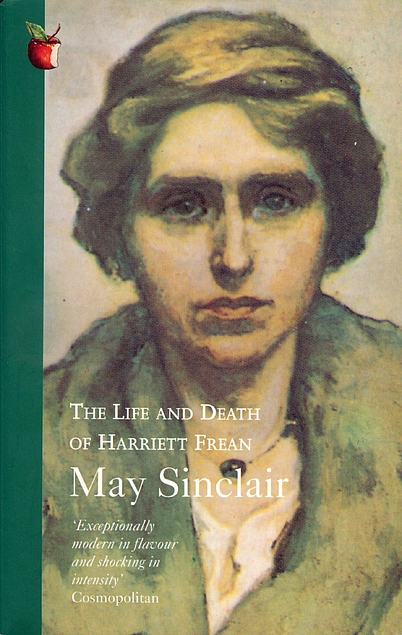 The Life and Death of Harriett Frean by May Sinclair was first published in 1922 but my copy is a Virago Press reprint from 1980. It has an introduction by Jean Radford. Although this book has 184 pages it has massive print so in reality I doubt if it would even be 60 pages with normal sized print.
The Life and Death of Harriett Frean by May Sinclair was first published in 1922 but my copy is a Virago Press reprint from 1980. It has an introduction by Jean Radford. Although this book has 184 pages it has massive print so in reality I doubt if it would even be 60 pages with normal sized print.
The blurb on the back says: Ironic, brief, intensely realised, The Life and Death of Harriett Frean is a brilliant study of female virtue seen as vice, and stands with the work of Virginia Woolf and Dorothy Richardson as one of the great innovative novels of this century.
Harriett Frean has been born into a comfortable Victorian household. An only child she has been rigidly brought up to always do the right thing, no matter what. The upshot of that is that when she falls for Robin, her best friend Priscilla’s fiance, and Robin falls for Harriett she refuses to go with her heart much to Robin’s sorrow, and his marriage goes ahead. Harriett is sure that she has done the right thing, and when her mother finds out she praises her self-sacrificing daughter. But her action ends up having a domino effect which ruins Priscilla’s life as well as Robin’s, and Harriett’s as she never moves on from her upbringing, never matures and has thoughts of her own. Never questions the attitudes of her parents. Harriett’s mother is such a fine upstanding member of society that she throws out the maid when she gets pregnant and feels no remorse when the baby dies.
Harriett holds her parents in such high esteem that it comes as a shock to her when years later one of her childhood friends tells Harriett that her father’s bad financial advice had led to the ruin of her father and others in the community.
As an old lady, when new neighbours move in across the road Harriett holds herself aloof from them, she’s sure her parents wouldn’t have approved of the family. Seven years later she discovers that the father of that family had a similar position to her father in society, but for them it’s too late to become friends.
Her father is Hilton Frean and she is amazed when that name is met with a blank stare when she had expected to be shown great respect. Time has marched on, but Harriett had never left her childhood.
I can’t say that I really enjoyed this one, for me there were no likeable characters, I was glad that it wasn’t a long read.
I bought my copy of th ebook in a charity shop recently and I really bought it because it was a Virago in really good conditon, but I didn’t look inside it, I wish I had because somebody had scribbled thoughts all over it, and about half of the book had been underlined – so annoying.

I can’t make sense of the publisher’s blurb but I think I can identify the inspiration. “The Feminist Companion to Literature in English” (Yale, 1990), states: “Her semi-autobiographical novels, ‘Mary Oliver’ and the ‘Life and Death of Harriett Frean’, place her with Virginia Woolf and Richardson as a major modernist writer who saw the connection between experimental writing and her own ‘difference’ as a woman.”
The entry on Sinclair ends rather mysteriously with: “Generally acknowledged in the 1920s as one of the most important writers of her day, the decline of her reputation is an enigma.”
Janusz,
Well, I wasn’t that impressed. It’s really sad if it was autobiographical. I think that growing up should include realising that your parents aren’t perfect, as nobody can be. I think that sort of writing has just fallen out of fashion, if it was ever in fashion.